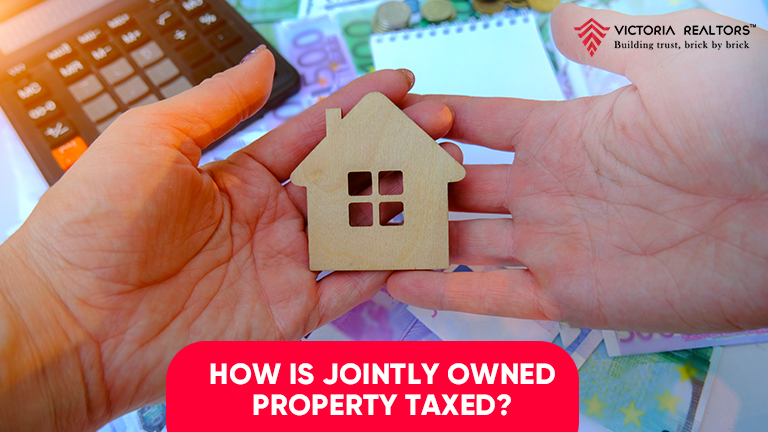 enquiry@victoriarealtors.in
enquiry@victoriarealtors.in
 919769829604
919769829604
 enquiry@victoriarealtors.in
enquiry@victoriarealtors.in
 919769829604
919769829604

Homebuyers can jointly own or co-own a property for various reasons like sharing a loan, smooth succession, funding, and other reasons. In Indian families where both spouses work, a joint home loan is the most preferred. The same case applies to siblings in many families. Though the joint purchase of a residential property isn’t very different from single ownership, their taxation is slightly more complicated. Taxes can be applied on any profit that an owner may be gaining from their property either through rent or sale. Similarly, tax benefits that come with home loans can be claimed by co-borrowers.
Co-ownership/joint ownership vs co-applicant
Co-owner and joint owner of a property are interchangeable terms. However, a co-applicant or co-borrower of a home need not necessarily be a co-owner of the property. Taxation of a jointly owned property comes with its own advantages. And only a co-borrower and a co-owner of the property can enjoy the tax benefits of a home loan.
What is Hindu Unit Family(HUF)?
Under the Hindu Law, a Hindu Unit Family or a HUF is a family consisting of members lineally descended from a common ancestor including wives and unmarried daughters. A HUF cannot be ‘created’ under contracts, but can only be created naturally. Though Jain and Sikh families aren’t governed by the Hindu Law, they are treated as HUFs under the Act. The Income Tax Act issues clear directives for the taxation of HUFs.
The Income Tax Act
The Indian Income Tax Act directs that all single owners of a property may be taxed as an ‘individual’. However, for jointly owned properties, the owners are categorized as:
1. An association of persons
2. A body of individuals
3. A partnership firm
In the case of a jointly owned property, Section 26 of the Income Tax Act lays down clear guidelines for the taxation of the co-owners of the property. The income from a property is either the rental income gained from it or the capital income from the sale of the said property. Section 26 of the Act clearly directs that if the share of each of the joint owners is specifically defined and is ascertainable, then the share of each owner is considered taxable as an individual owner and not as AOP (Association of Persons) or BOI (Body of Individuals). In the case of a Hindu Undivided Family (HUF), the property is not considered jointly owned. The income gained through such HUF shall be taxable as a single-owned property and not apportioned among the family members.
How is the ownership share of a co-owned property determined?
When co-owners of a property is added to a will, they may have varying shares of the property. At times, more co-owners are added to the will for various reasons like a smooth succession of the property. It is important to note that the respective share of the co-owners of the property will be corresponding to the ratio of their contribution towards the purchase of the property.
The contribution of the co-owner towards the purchase of the property may be in the way of downpayment, or their share of the home loan taken. The cost each owner incurred during or after the purchase of the property can be ascertained from bank statements. But, if a co-owner hasn’t contributed towards the purchase of the property, then for income tax purposes, they will not be considered a co-owner and this applies even if their name is included as a co-owner in the deed. This could happen when the co-owner is added only for the sake of clear succession and not for loan repayment.
Taxation of the rent received from a jointly owned property
For a jointly owned property that has been rented out, the rent received is to be apportioned as per the ownership ratio. The rent divided is considered the annual value of the property, of which 30% of the rent value is deducted to arrive at the taxable rent value. In addition to the standard 30%, co-owners can also deduct any cost they may incur in the way of construction, repair, renovation, etc.
Taxation of the profit from selling the co-owned property
Taxes can be applied on the profit owners make after a sale. In the case of profits co-owners may arrive at after selling their jointly owned property, taxes are applied to individual owners and their share of profits, and not on the property as a whole. The apportionment of the profit from selling the property is ascertained at the ‘sale consideration’ and ‘cost of acquisition’ stages. This is again determined from their share of the home loan and contribution towards the purchase of the property.
Taxes and finances can seem complicated, especially when it comes to joint ownership. But like a lot of other advantages that come with joint homeownership, taxation procedures pertaining to jointly owned property can also come as a huge relief to co-owners of a property.


While enough care is taken by the firm to ensure that information on the website is up to date, accurate and correct, viewers of this website confirms that the information including brochures and marketing materials are solely for informational purposes and the viewer should not rely on this information for making any booking/purchase in any of the projects of the firm. Nothing on this website constitutes advertising, marketing, selling or an offer for sale or invitation to purchase a unit in any projects by the firm. Viewers are requested to make their independent enquiry before relying upon the same. Any action you take upon the information on the website is strictly at your own risk, and the firm or its associated entities/companies will not be liable for any consequences of any action taken by the viewers relying on such material/information by viewing the website or its content.
The firm reserves the right to add, alter or delete any material from the website at any time and may, at any time, revise these terms, change design & specifications, without prior notice or as may be required under applicable laws including RERA, and all other approvals & permissions. Computer generated images, rendered images, floor plans, etc. represent artistic impressions only. Plans, specifications mentioned in the buyer-seller agreements are final and supersede the contents/information herein. Any viewer of any information or material from this website may avail the same entirely at their own risk as to costs and consequences thereof.
I authorize victoria Realtors and its representatives to Call, SMS, Email or WhatsApp me about its products and offers. This consent overrides any registration for DNC / NDNC.



Leave a comment